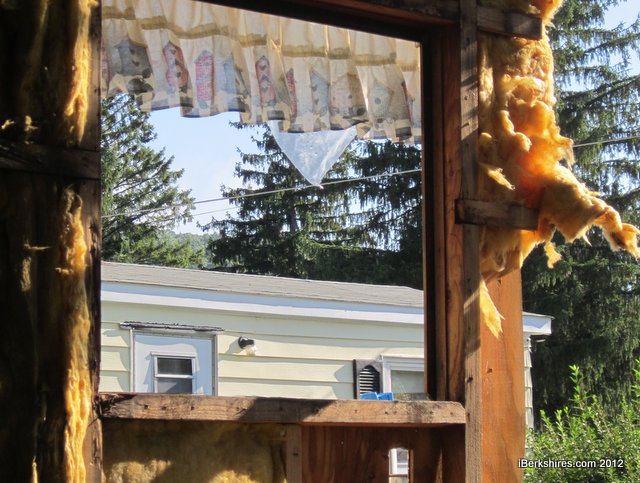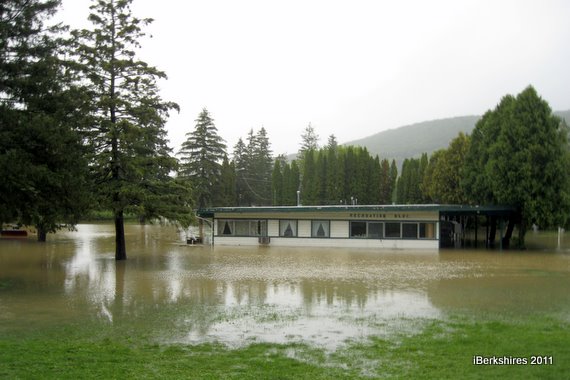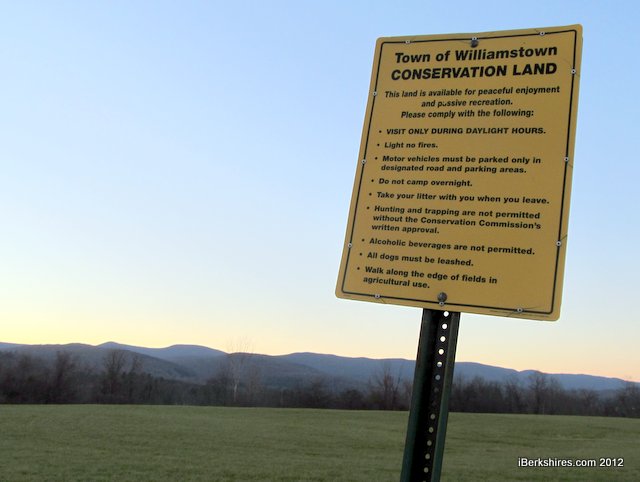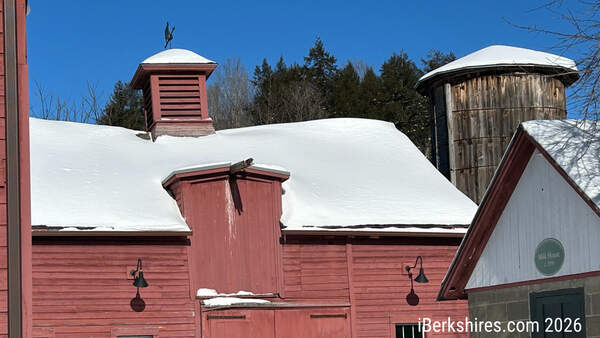Residents Divided Over Future of Spruces Mobile Home Park
|
Spruces residents have differing views on the mobile home park's future: Some think it can be saved, others that it's time to move. |
WILLIAMSTOWN, Mass. — Dave Witherell has only lived at the Spruces Mobile Home Park for five years, but his connection to the place goes back much longer.
He can remember when it was expanded from 150 units to 226 in the 1970s. He can remember inheriting his aunt's home at the park and selling it for $38,500 in the 1980s. And he can remember all to well the 2011 tropical storm that decimated the community.
He is among five dozen homeowners who continue to call the Spruces home today, and he wishes everyone shared his vision of returning the park to its former glory.
"This was a five-star park," Witherell says during a conversation in the Spruces' Recreation Hall. "I would love to see this place rebuilt. It's more feasible than the alternative."
"The alternative" he refers to is a plan that would see the town of Williamstown close the park after it assumes ownership from Morgan Management, the western New York developer that leases land to homeowners like Witherell.
The town has applied for a Hazard Mitigation Grant from the Federal Emergency Management Agency. If the $6.25 million grant is approved, the town would buy out Morgan Management for $600,000 and be required, by the terms of the grant, to dismantle the park so that no one could live there and be at risk to another major flood event like Tropical Storm Irene.
With the net proceeds of the grant — after paying Morgan Management and removing the park's infrastracture — the town plans to begin developing affordable housing on a parcel of town-owned land off Stratton Road known as the Lowry Property.
Town officials say that is the best way to replicate the kind of independent, single-family housing community that seniors at the Spruces enjoyed for decades.
But some current residents, like Witherell, say otherwise and have made their sentiments known at Selectmen's meetings. Together, they formed the Save the Spruces Committee, and they claim about 37 members, according to committee's chairman.
To date, those Spruces residents are the only ones who have spoken up.
That is about to change.
"I don't think all the residents have been represented properly," said Carol Zingarelli, who believes the park cannot be saved.
"From here forward, we will be going to some of the town meetings and the Affordable Housing (Committee) meetings as well for those voices to be heard. I think people have been kind of waiting to see what's going to happen.
"Those who are not in favor of saving the Spruces felt there was enough support within the town and from other entities that we didn't need [to speak up]. I believe it's absolutely time that that side is heard."
Zingarelli has company in Charlene Blood, who, like Witherell, is a five-year resident of the park. Blood said she personally knows about 25 residents who are not looking to remain in the park, but she suspects there are even more than that.
The issue of what can — or should — be done with the park has turned neighbor against neighbor, she said.
"You go down the road and you run into your neighbor, and you're not sure if you want to talk to them or not," Blood said. "You don't know who is going to say what. A lot of people are afraid to express their opinion."
Could a co-op work?
Peter Russell makes no secret of where he stands on the issue of closing the park.
|
Residents who formed the 'Save the Spruces' group think the park can be restored to it's former glory, albeit on a smaller scale. |
As chairman of the Save the Spruces committee, Russell is espousing the group's five-year plan to renovate the park, beginning with its purchase by a yet-to-be formed non-profit cooperative of residents.
He recognizes that any such plan would be made moot if the FEMA grant comes through and the town completes the buyout agreement it reached with Morgan Management. But as long as the status of the grant remains unknown, there is hope for the committee, which has 10 active members in addition to "another 27 people who want to be involved," Russell said.
"[If FEMA rejects the grant], I would think our next position would be to go to the governor and ask for funds from [the Department of Housing and Urban Development] ... to buy the park and renovate it and bring it back to life," Russell said. "We have a five-year plan to bring the park back to life — not as big as it was before Irene, but bigger than it is now, back to its original size in the 1950s. It was expanded in westward in the '70s, and that's where most of the flooding happened."
Russell said he plans to seek help from a Shelburne Falls-based non-profit, the Cooperative Development Institute, which since 2009 has helped seven manufactured home communities form nonprofits — four in Massachusetts and three in Vermont.
Russell estimates that a Spruces cooperative would need at least $1 million in capital to get started — $600,000, assuming Morgan Management is still willing to accept that figure, and $400,000 to bring the park back to life.
"In five years, with grants and government help, we could be financially viable and be home to 150 senior citizens," Russell said. "You can't create something like that for a million dollars anymore. You can barely build four houses for a million dollars."
Zingarelli does not know how the cooperative could raise half that amount.
"Who is going to put their name on the mortgage for $600,000 or even $500,000?" she asked. "There are only 68 homes here right now, and most people live on their Social Security.
"Organizing as a co-op, a not-for-profit, that's also going to take huge sums of money to get it going, to get an attorney and handle all the operating expenses, protecting the place if it floods again. Who is going to jump in at that pont?"
What can be done?
If someone wanted to buy the Spruces property and operate it as a mobile home park, they would have to figure out a way to deal with flooding that has plagued the park for years.
Russell believes part of the solution lies in improving drainage from two streams that run into the property from the south, across Main Street (Route 2). Although the Spruces property abuts the Hoosic River to the north, Russell maintains that the river was not the problem during Tropical Storm Irene.
Rather, he says, it was runoff from Paull Brook on the north side of the Spruces property and an unnamed stream on the south end of the property.
Last month, the Save the Spruces group asked the Board of Selectmen to ask the Army Corps of Engineers to study the property and see if future floods could somehow be prevented.
"The best case scenario is we divert the two brooks that are coming across [Main Street]," Russell said.
"[The unnamed stream] has always been a problem, and in 2005, they did a study to add a second pipeline from here all the way down to the river bank. That would have cost $750,000, and nobody wanted to pay for it. ... (Morgan Management) wouldn't pay for it, the town wouldn't pay for it, nobody wanted to pay for it, so nothing happened.
"Right now, we're waiting to hear from the Corps. That's where we are. Then we'll decide what to do next."
Russell and Witherell said part of the problem is that a 36-inch pipe that carries water into the southwest corner of the Spruces property from across Main Street brings far too much water for the 24-inch pipe it is supposed to feed.
"It doesn't fit in heavy rains," Witherell said. "I've seen water shooting up eight feet in the air."
Williamstown Public Works Director Tim Kaiser agrees that the owner of the park installed an inadequate pipe to take water from the 36-inch drain to the river at the north end of the park.
But that is only a small part of the problem.
"The real issue occurs with that [24-inch] pipe when the river rises and covers the outlet of the pipe," Kaiser said.
And that is exactly what happened during Tropical Storm Irene, Kaiser said. The river rose higher than the pipe's opening, blocking the runoff and forcing water back into the flood plain. As a result, the flood plain filled from both directions.
Kaiser remembers the 2005 study Russell cites and said the town looked into ways to prevent flooding at that time. Unfortunately, no solution proved feasible.
"We applied for a FEMA grant to look at rerouting the pipe ... but it wouldn't have made a difference," Kaiser said. "It might mitigate some nuisance flooding that is inconvenient, but the real threat is from the river. FEMA felt that way, too. They wouldn't even consider funding [pipe work].
"They are considering funding to remove [residents] from the park because they see that that's an effective way to get them out of harm's way."
Russell and Witherell insist there has to be another way. And their proposal, they say, ultimately would cost less than tearing down the Spruces and starting from scratch on the Lowry Property.
"You look at the Lowry lot - it's all open space," Witherell said. "Look at the cost of putting in the infrastracture up there: the blacktop, the electrical, the storm drains. All that is right here. It has to be added to Lowry.
"When you weigh the cost of that against the cost of making this a viable community, [Lowry] doesn't make sense."
Could it happen again?
Underlying the Save the Spruces' plan to fix the flooding problem at the park are a pair of assumptions: A) that the flooding during Irene was exacerbated by acts of man and B) Irene was a rare event, and it is imprudent (to coin a phrase) to throw the baby out with the stormwater.
"We've only had a storm of this magnitude once in 60 years," Witherell said, implying that another Irene-sized event is unlikely in the near future.
Kaiser said history tells a different story.
|
Local officials say the 60-year-old park is in danger from the river and that won't change. |
"When you look back in the records of storm events, [Irene] was only the fourth or fifth biggest storm since they started keeping records," he said. "We've had three much larger storms, but all of those were before the park.
"For folks to say they're not in harm's way is naive. They are in harm's way — from the river — and there is no practical way to control that."
And, in fact, long before Irene, there was fear of flooding among residents at the park.
"Six months before Irene hit the Spruces, the Mobile Home Rent Control Board, which I sit on, concluded seven months of meetings in which it dealt with Morgan's request for a rent increase and the tenants' association's resistance to that," said Cheryl Shanks, who also serves on the town's Affordable Housing Committee.
"I think that it's fair to conclude from the evidence presented at those meetings — also saved — that the Spruces residents felt that they lived in a community that was vulnerable to flooding, standing water, broken and unreliable infrastructure, and sporadic services."
Witherell and Russell would agree with the idea that the infrastructure is "broken" and the services "sporadic."
"[Morgan] took us for every bit of profit they could get, and we lost all of our amenities," Witherell said. "That happened with two previous owners, too, if I'm not mistaken. They took every bit of profit they could and didn't put much back."
Russell and the Save the Spruces group recognize that if the FEMA grant does not come through and the town does not end up closing the park, Morgan Management will. The company is on record saying the park is not financially viable with the number of sites available for rental post-Irene. That is why Russell's five-year plan is predicated on a cooperative of residents buying the park.
As for the notion that development south of the mobile home park has made it more prone to flooding, Russell points to the removal of trees to acccommodate an expansion at the Harriman & West Airport in 2010.
"They cut down 200 trees at the airport and changed the direction of the runway - that's when all the flooding started," Russell said. "That made the flooding worse."
Kaiser said runoff from the airport is not the problem. The Hoosic River is the problem.
"The airport [feeds] Paull Brook that runs beside the park, and I've never seen that run over unless the river floods," he said. "The channel has enough capacity unless the river is backing up.
"The Spruces didn't flood because of too much water from uphill. The edge of the river at the height of that storm was Route 2."
Can tensions be eased?
There is one point on which all sides of the Spruces question will agree: The town manager was prescient at the Nov. 13 Selectmen's meeting where he announced the town's plan and said, "This is a long, complicated and emotional process."
Listen to Russell talk about the issue, and his anger is apparent.
"It's really kind of unfair to be picking on senior citizens like this," he said. "It really is."
He declines to name names, but he asserts that there are people in town who have wanted to get rid of the mobile home park for years and are taking advantage of an opportunity presented by the flooding from Tropical Storm Irene to do so.
"We've always had that sense," said Russell, who moved to the Spruces in 2005.
"How can I prove [who is picking on them]? I can't prove any of it. It's just an assumption we've always had."
Witherell makes the assumption that someone stands to gain from the town's acquistion of the Spruces property.
"It's 118 acres on Route 2 in Williamstown," he said. "It's a very valuable piece of land. What are their plans for this land in the future? I don't know."
Fohlin said the town has no such hidden agenda.
"The only goal of the town is to provide decent, safe and sanitary housing for the remaining Spruces residents who remain in harm's way waiting for the next 'Irene,' " he wrote in an email seeking comment for this story. "The locations being proposed for replacement housing are more valuable than the Spruces flood plain land. If the goal had been to eliminate the Spruces, we would not have put so much effort into making it possible for 66 homeowners to return.
"We have also provided the residents with a copy of the 'Attorney General's Guide to Manufactured Housing Community Law,' so they may exercise their rights, and we have encouraged them to form a cooperative if they wish to exercise their right of first refusal to purchase the park themselves. If the residents truly want to control their own fate and stay in a flood plain, they should offer Morgan Management to purchase the park now at the bargain basement price of $600,000. The town will not stand in their way, and it will save FEMA, (the Massachusetts Emergency Management Agency) and us a lot of work."
There is plenty of emotion among those Spruces residents who are in favor of the town's plan. In their case, it's not anger but fear of the unknown.
"The group that is opposed [to the grant] organized themselves, but everybody else is hoping the grant comes in and we'll be able to move to the Lowry Property," Zingarelli said. "The concerns are: If this grant does not come through, what's going to happen?
|
|
"Morgan Management, of course, has already put in an application with the attorney general months ago to cease business here and not be a mobile home park. Our concerns are that Morgan Management either will file for bankruptcy or cease to exist, and then any kind of protection under mobile home manufactured laws will be difficult to pursue. If it had to go into court, it could take years."
Zingarelli said she can appreciate the position of the Save the Spruces group, but she does not have much confidence in its five-year plan.
"I understand them wanting to stay in their homes and wanting to try, and I believe everyone should get a fair shake at trying to achieve a goal, but I personally don't think it's viable," she said. "I don't want my name on a mortgage for that amount of money.
"There are so many variables that could happen if it could be purchased by a co-op. What if a flood comes and people are flooded out of here again? There are just too many unknowns for my comfort level."
Perhaps the great irony here is that people on both sides of the issue evoke images of the close-knit community that once thrived at the Spruces. Russell and his group say such a community could rise again on the site; the town hopes to recreate that kind of community on the Lowry Property.
But in the present, the two very different visions of the future are dividing the residents who are there.
"Sometimes, you have to stop and think, logically, and realize the Spruces was a great place, but it's never going to be that again. I'm sorry, but it's not going to," said Zingarelli. "The fact that it's dragging on and on is making it harder and harder for people. You go out your door, and you don't know what opinion you're going to encounter.
"It's really separated this community a lot. That's sad."
Tags: affordable housing, FEMA, flooding, Irene, Spruces,


.JPG)

 The town has applied for a FEMA grant that would allow it to build new housing for Spruces residents. Land off Stratton Road is considered a prime location.
The town has applied for a FEMA grant that would allow it to build new housing for Spruces residents. Land off Stratton Road is considered a prime location.













